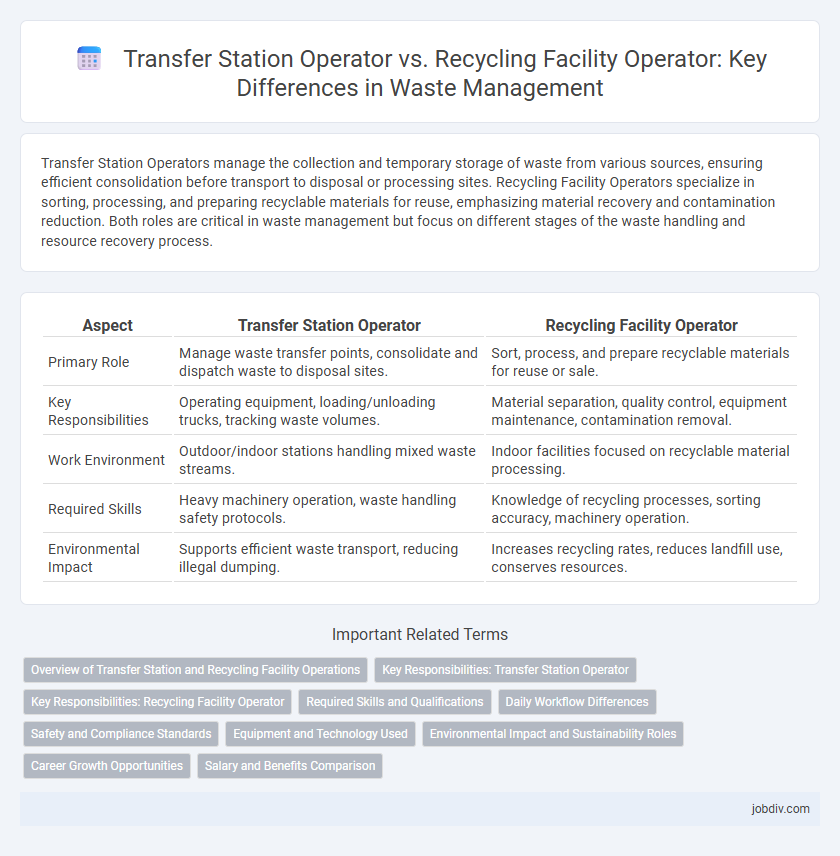Transfer Station Operators manage the collection and temporary storage of waste from various sources, ensuring efficient consolidation before transport to disposal or processing sites. Recycling Facility Operators specialize in sorting, processing, and preparing recyclable materials for reuse, emphasizing material recovery and contamination reduction. Both roles are critical in waste management but focus on different stages of the waste handling and resource recovery process.
Table of Comparison
| Aspect | Transfer Station Operator | Recycling Facility Operator |
|---|---|---|
| Primary Role | Manage waste transfer points, consolidate and dispatch waste to disposal sites. | Sort, process, and prepare recyclable materials for reuse or sale. |
| Key Responsibilities | Operating equipment, loading/unloading trucks, tracking waste volumes. | Material separation, quality control, equipment maintenance, contamination removal. |
| Work Environment | Outdoor/indoor stations handling mixed waste streams. | Indoor facilities focused on recyclable material processing. |
| Required Skills | Heavy machinery operation, waste handling safety protocols. | Knowledge of recycling processes, sorting accuracy, machinery operation. |
| Environmental Impact | Supports efficient waste transport, reducing illegal dumping. | Increases recycling rates, reduces landfill use, conserves resources. |
Overview of Transfer Station and Recycling Facility Operations
Transfer station operators manage centralized facilities where waste is temporarily held, sorted, and compacted before transportation to final disposal or recycling centers, emphasizing efficient volume reduction and logistics coordination. Recycling facility operators oversee the processing of collected recyclable materials using advanced sorting technologies, mechanical separation, and quality control systems to transform waste into reusable raw materials. Both roles require expertise in waste handling regulations, equipment maintenance, and environmental compliance to optimize material recovery and minimize landfill dependency.
Key Responsibilities: Transfer Station Operator
Transfer Station Operators manage the receipt, sorting, and temporary storage of waste materials at transfer stations to ensure efficient waste transfer to final disposal or recycling facilities. They oversee vehicle traffic, inspect incoming loads for prohibited items, and maintain operational safety and environmental compliance. Monitoring equipment performance and coordinating with hauling companies are essential to optimize transfer station throughput and minimize downtime.
Key Responsibilities: Recycling Facility Operator
Recycling Facility Operators manage the sorting, processing, and preparation of recyclable materials for shipment to end-use manufacturers, ensuring compliance with environmental regulations and safety protocols. They operate machinery such as balers, crushers, and conveyors to optimize material recovery and maintain quality standards. Key responsibilities include monitoring contamination levels, coordinating with waste collection services, and maintaining accurate operational records to support sustainability initiatives.
Required Skills and Qualifications
Transfer Station Operators must possess strong organizational skills, knowledge of waste sorting procedures, and certification in heavy equipment operation to manage incoming waste efficiently. Recycling Facility Operators require expertise in material recovery techniques, familiarity with automated sorting technology, and understanding of environmental regulations related to recycling processes. Both roles demand adherence to safety protocols, basic mechanical skills, and the ability to monitor operational equipment to ensure compliance and efficiency.
Daily Workflow Differences
Transfer Station Operators manage the receipt, sorting, and temporary storage of mixed waste from collection vehicles to optimize load consolidation before transport to disposal or processing sites. Recycling Facility Operators focus on the daily workflow of sorting, processing, and quality control of recyclable materials such as plastics, metals, and paper to prepare them for manufacturing reuse. Key workflow differences include Transfer Station Operators emphasizing logistics and waste volume management, while Recycling Facility Operators prioritize material contamination reduction and efficient sorting technology operation.
Safety and Compliance Standards
Transfer Station Operators adhere to strict safety protocols to manage incoming waste efficiently, minimizing exposure to hazardous materials and ensuring compliance with OSHA regulations. Recycling Facility Operators implement advanced sorting technologies and maintain environmental compliance by following EPA guidelines for handling recyclables and waste byproducts. Both roles require rigorous training in emergency response procedures and continual monitoring to uphold workplace safety and regulatory standards.
Equipment and Technology Used
Transfer Station Operators utilize heavy-duty compactors, front-end loaders, and tipping floors to efficiently manage and consolidate incoming waste from collection vehicles, optimizing space before transport to disposal sites. Recycling Facility Operators employ advanced sorting technologies such as optical sorters, magnets, eddy current separators, and conveyor belts to accurately separate recyclable materials by type and quality. The integration of automated systems and real-time monitoring software enhances operational efficiency and material recovery rates in recycling facilities.
Environmental Impact and Sustainability Roles
Transfer Station Operators primarily manage the temporary holding and sorting of waste to streamline transportation, minimizing landfill overflow and reducing greenhouse gas emissions associated with multiple collection trips. Recycling Facility Operators focus on processing and transforming waste materials into reusable resources, directly supporting circular economy principles and lowering the demand for virgin raw materials. Both roles are critical in enhancing waste diversion rates and mitigating environmental impacts through improved resource recovery and sustainable waste management practices.
Career Growth Opportunities
Transfer Station Operators typically gain hands-on experience in waste management logistics, positioning themselves for supervisory roles within municipal waste services or private logistics companies. Recycling Facility Operators develop specialized skills in sorting, processing, and quality control of recyclable materials, often leading to advancement in environmental compliance, facility management, or sustainability consulting. Career growth in both roles depends on acquiring certifications in waste handling, environmental regulations, and technology-driven waste processing systems.
Salary and Benefits Comparison
Transfer Station Operators typically earn an average salary ranging from $30,000 to $45,000 annually, while Recycling Facility Operators often receive a higher salary between $35,000 and $50,000 due to specialized skills. Benefits for both roles commonly include health insurance, retirement plans, and paid time off, but Recycling Facility Operators may have access to additional training programs and performance bonuses. Salary growth prospects tend to favor Recycling Facility Operators because of increasing demand for sustainable waste management expertise.
Transfer Station Operator vs Recycling Facility Operator Infographic

 jobdiv.com
jobdiv.com